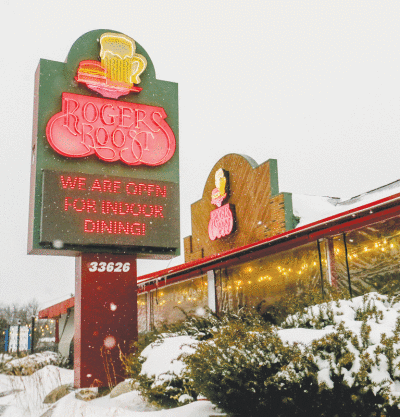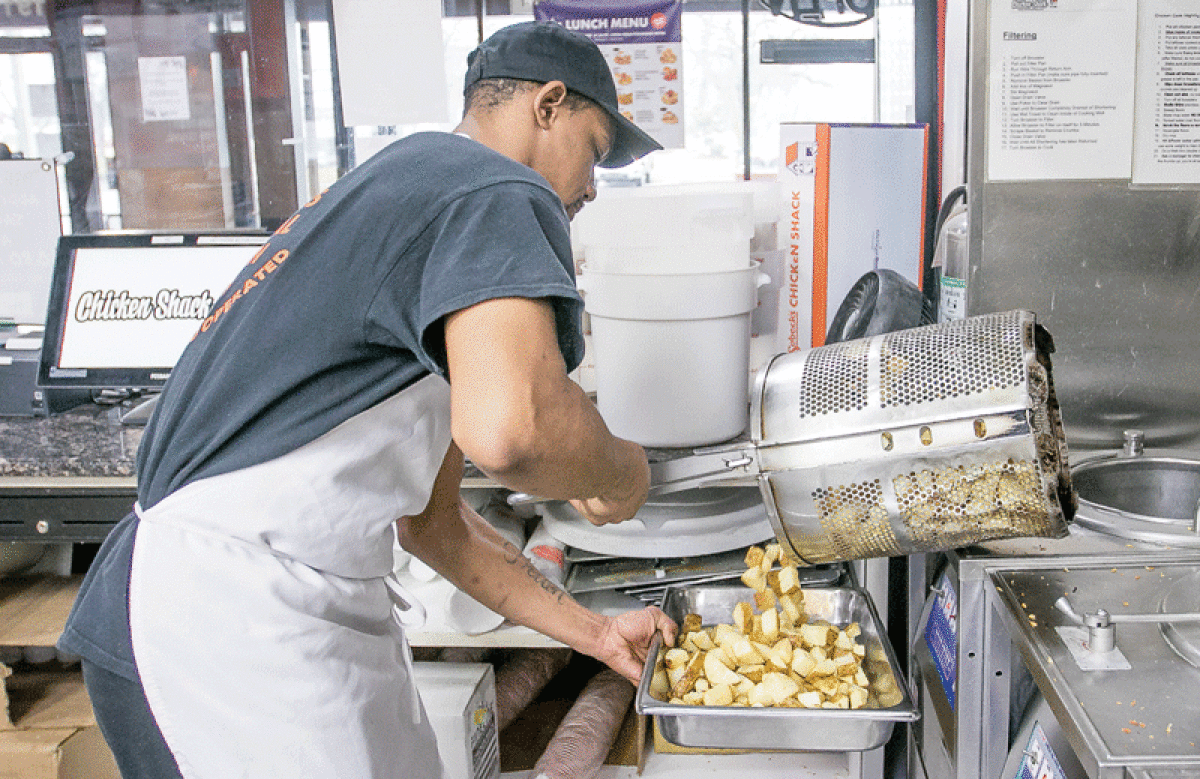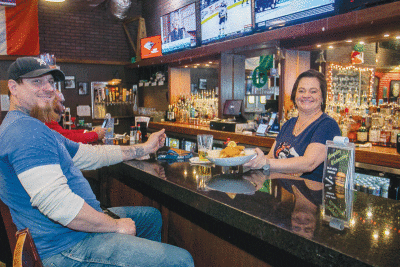
Brian Majewski from Roger’s Roost in Sterling Heights says the restaurant has been a part of the community for over 50 years, and he hopes it will continue to be for another 50 years. This photo was taken in 2021.
File photo by Patricia O’Blenes
METRO DETROIT — As restaurants look ahead toward 2023, they are still seeing challenges that the COVID-19 pandemic originally served up almost three years ago.
Johnathon Sesi, the co-owner of Sobeck’s Chicken Shack in Southfield, said he thinks the COVID-19 pandemic is “more in the rearview mirror” but added that the long-lasting effect has been that prices are up, including labor costs.
“At this point in time, it seems like the supply chain is getting back on chain,” he said. “There aren’t many shortages and delays. … But prices are still on the rise, so we have to adjust our prices to reflect those (wholesale) prices, and some customers are turned away. Prices are up probably close to 15%, maybe 20%, on some products.”
Sesi said he hopes that the restaurant industry in 2023 sees at least somewhat of a plateau in costs for food ingredients, food packaging and other supply costs.
He also hopes to see more people wanting to work for the restaurant industry. He said one challenge is that jobs at the quick-service level often serve as a stepping stone to a later job — but lately, more people are stepping over it entirely.
“Prior to 2020, we would see 10-15 applications per month,” he said. “And now we’re lucky if we see two to five applications.”
Changes in dining habits have also largely held steady since COVID-19, Sesi said. In his case, carryout and delivery still make up around 80%-85% of Chicken Shack’s business, he explained.
He said his restaurant, located along Northwestern Highway, used to see a significant dine-in crowd before 2020 due to several nearby office buildings. But he said he doesn’t know if those buildings have been reoccupied yet.
“They seem to be fairly vacant,” he said. “I see ‘for lease’ signs everywhere.”
‘Everything is spiking’
Doug Young owns multiple restaurants, including two Irish Tavern locations, in Madison Heights and Waterford, as well as Fork n’ Pint locations in Lake Orion and Waterford, and The Burger Bar and Tap in Flint. He said inflation and dining changes have had an effect on his businesses, too.
“We know that we are in for more challenges in 2023,” Young said. “We had to change some of our operations to try to stay ahead of it and do our best to not have to pass costs onto the consumer.”
Young said the inflation is “coming from every direction,” and often, products that his businesses usually buy are out of stock.
“You’re trying to find replacement stuff at comparable costs,” he said.
He said his business has purchased extra storage so it can buy supplies in bulk and get savings when possible. However, he added that the option works better for nonperishables than perishables.
“In these volatile times, we really try to be as smart as we can,” he added. “It changes daily. We have a lettuce or vegetable challenge that will spike 300% for a couple of weeks. Dairy, then meat, then packaging. Everything is spiking.”
Young said that when prices do decline, they “never go down as low” as what they once were. He added that Michigan restaurants are also keeping an eye on changes in the minimum wage.
According to the state, the general minimum wage was raised Jan. 1 from $9.87 per hour to $10.10, and the hourly rate for tipped workers was raised to $3.84. And Young said a current legal battle could elevate the minimum hourly wage even further.
Young also pointed to the impact that the COVID-19 pandemic has had on customers’ dining habits. He said that while people are dining in more, carryout and delivery service orders are still much more common than a few years ago.
“The evening business after your typical dinner hour has really decreased,” he said. “It’s a real struggle to get evening sales.”
And while delivery apps and services are popular, they charge around 20% of what his restaurants sell, he explained.
“It helps to have them, but they’re not nearly as profitable as your own internal sales,” he said.
Young said, overall, he thinks the business environment will be tough at least until summer.
“I’m hoping by summer things start to level out and get back into place,” he said. “We know the challenges are not over. It’s been a heck of a three-year challenge for everybody, but I think the restaurants have really taken it on the nose.”
‘A staple in the community’
Brian Majewski, a manager at Roger’s Roost in Sterling Heights, says his restaurant is trying to put the COVID-19 situation behind it. He said that while his customers recently had a lot of holiday parties at the venue, dine-in traffic still isn’t how it used to be pre-2020.
He also described how food ingredient prices have been fluctuating, adding that lettuce around a month ago was over $100 for a case, though more recently it dropped to around $80.
“The costs of goods is ridiculous,” he said. “Beer is probably cheaper than milk.”
But in the end, Majewski said, Roger’s Roost plans to stick around.
“We have been a staple in the community for over 50 years and hope to continue to be for another 50,” he added in an email.
Learn more about Sobeck’s Chicken Shack in Southfield by visiting www.chickenshack.com or by calling (248) 945-0900. Find out more about the Irish Tavern in Madison Heights by visiting itmadisonheights.com or by calling (248) 591-4039. Learn more about Roger’s Roost in Sterling Heights by visiting www.rogersroost1.com or by calling (586) 979-7550.
 Publication select ▼
Publication select ▼






















